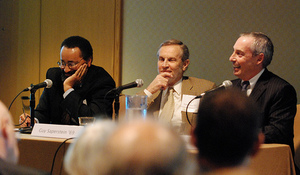
By Sharon Rohwer
Public attention may have shifted toward the sobering challenges facing the next president, but the spontaneous cheering from the at-capacity crowd at the Hyatt Regency San Francisco suggested the post-election excitement hasn’t dimmed.
During one of the largest events ever organized by the law school’s Alumni Center, a three-member panel led by Dean Christopher Edley, Jr. discussed the highs and lows of the 2008 presidential campaign and expectations for 2009 and beyond.
Regardless of party affiliation, the panel of political experts agreed on several key points, including the extraordinary nature of President-elect Barack Obama’s campaign.
“Two and a half years ago, I was asked if I thought America was ready to elect a black president,” Edley said. “I didn’t think so at the time, but I was hopeful. I suspended cynicism. Still I was completely amazed—not by Obama, but by what the country accomplished. The proof was getting as far as he did. He won after Iowa.”
Even the Republican on the panel admitted that Obama’s was one of the best campaigns ever run. That said, Dan Schnur, former communications director for John McCain’s 2000 presidential bid, pointed out that the candidates were in a dead heat until September 15, “when Wall Street collapsed right on top of McCain.”
Still the Economy, Stupid?
Could Obama have won without the financial crisis?
“McCain’s campaign was held together by chewing gum and spit wire,” said Schnur, visiting instructor at UC Berkeley’s Institute of Governmental Studies. “But would America elect a minority president under less dire circumstances? I don’t know. When people are drowning, the skin color of the lifeguard doesn’t matter. In calmer surf, some voters might not have been willing to vote for Obama.”
Guy Saperstein ’69, founder of the National Security/Foreign Policy New Ideas Fund, former co-chair of the Democracy Alliance Strategy Group and “member of the nefarious Left-Wing Mafia,” as described by Bill O’Reilly in 2006, had a slightly different take on the subject.
“The economy didn’t preordain the election,’’ he said. “It afforded McCain the only opportunity he had to win. First, he had to take the populist approach and come out against the bailout. Second, he had to demonstrate real leadership behind the position. That could have changed the terms of the game.”
A Perfect Storm
On Obama’s transition, Saperstein continued to stress the financial crisis. “With a collapsed economy and global warming, it’s a perfect storm for investment in real, structural change, in clean energy and new jobs. We don’t need rebates so that Americans can go out and buy Japanese TVs.” What we need, he explained, is long-term change with short-term payback: something as simple—yet practical—as making buildings more energy-efficient.
Edley agreed. “The economic stimulus needs to spend out quickly and go away quickly. Construction takes too long. Writing rebate checks is quick, but it doesn’t have an optimal growth impact.”
A senior advisor on Obama’s transition team, Edley told the alumni audience that an economy team is one of a handful of policy teams working within Obama’s transition coalition. The others include national security, energy and climate change, health care, education, and immigration reform.
All those issues will be pursued in the first three months, said Edley, with intense deliberations to determine where there’s appetite for bold action. “Obama wants to do more rather than less. But the president doesn’t write legislation, Congress does.”
In addition to the major issues, Edley also places civic engagement high on Obama’s must-do list.
“People owned a piece of Obama’s campaign,’’ he said. “In March I asked him: What do you say to those people on Nov. 5? ‘Thanks?’
“He has a real shot at creating a different kind of democracy. The nature of give and take makes people feel a part of something larger than themselves. How can the administration sustain and build upon the new level of engagement?” Edley didn’t have the answer, but he said the commitment to work it all out is very real.
“I’ve been involved in three prior transitions—’76, ‘80, and ’92 —but this one is completely different,” he said. “It’s in fabulous shape, and given the challenges facing the next administration, it better be.”
View photos from the San Francisco event.
The San Francisco panel discussion was hosted by Morrison & Foerster’s Jim Brosnahan and Kathi Pugh ’90 and moderated by Jesse Choper, Berkeley Law’s Earl Warren Professor of Public Law.
On November 21, another post-election analysis was hosted by Bob Willett ’74 of O’Melveny & Myer in Los Angeles. Panelists included: Dean Christopher Edley; Maria Echaveste ’80, a former Senior Adviser to the Hillary Clinton campaign; Alisa Nave ’04, Political Director, Nevada Senate Democrats and former Political Director in Northern and Southern Nevada for the Hillary Clinton Campaign; and Pete Wilson ’62, former Governor of California, U.S. Senator, Mayor of San Diego and California State Assemblyman.